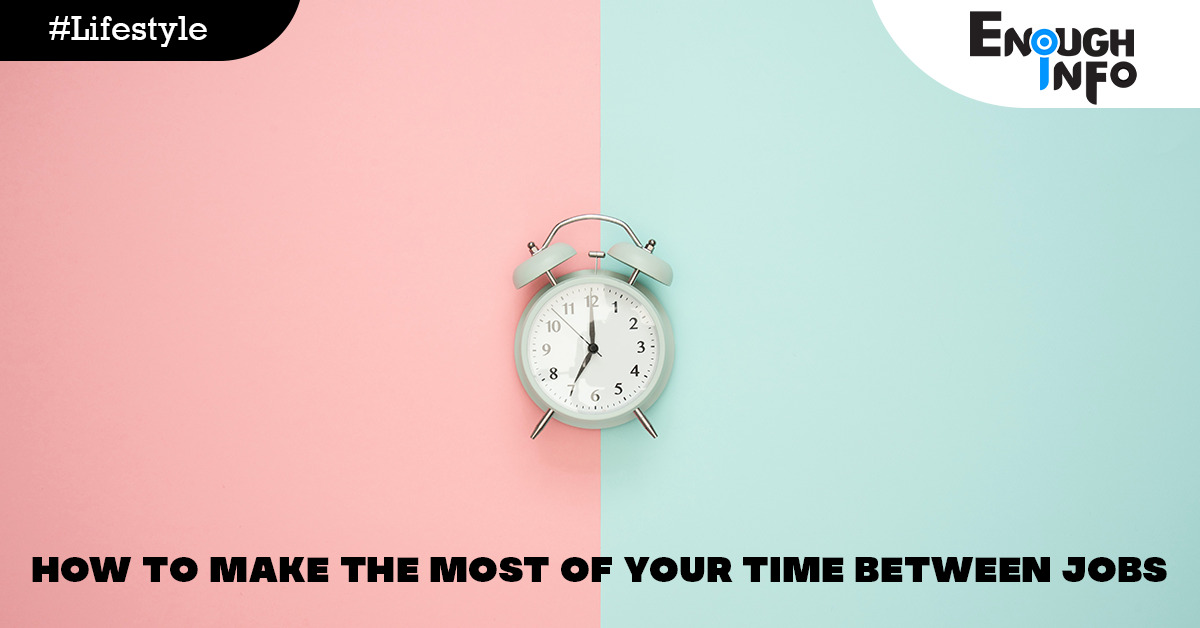
How To Make The Most Of Your Time Between Jobs: It might be intimidating to be in the midst of a professional break, especially if you find it difficult to occupy your free time. Fortunately, if you do find yourself unemployed for an extended length of time, there are various ways you may use this time to advance your career or even your personal growth. EnoughInfo.com
Read Also: How To Balance Work And Family(The Ultimate Guide)
Whether you voluntarily put your career on hold or are laid off, you can discover that your new-found independence has come with the extra burden of being unemployed.

The period between employment may be difficult and uncomfortable as one learns how to navigate the unfamiliar area of not having a job because many individuals spend years at a time being employed, having a constant salary and routine. Al-Ahli agrees MEGA deal to sign Manchester City’s best winger
FAQs & Answers on How To Make The Most Of Your Time Between Jobs
1. How can I stay motivated during my time between jobs?
Setting specific job objectives, developing your skills, and keeping a positive outlook may all help you stay motivated throughout this time. Remind yourself frequently of the opportunities that lay ahead and the need of lifelong learning. Boniface set to join German club Bayer Leverkusen for €20m
2. Is it beneficial to take online courses during my time off?
Yes, taking classes online may be really helpful. It enables you to develop your talents, pick up new ones, and show prospective employers how dedicated you are to your own progress.
3. How can networking help during my job search?
Networking is essential now since it might result in employment chances and useful business information. To broaden your network, participate in online events, sign up for organizations for professionals, and make connections with peers, mentors, and possible employers.
Read Also: Networking For Introverts (9 Tips To Help You Make Better Connection)
4. Should I consider volunteer or freelance work during this period?
Yes, doing freelance or volunteer work may help you get useful experience and stay active in your area. Additionally, it enhances your resume and demonstrates to future employers your dedication to continuing your involvement in your field. Best Practices For Managing Cash Flow
How To Make The Most Of Your Time Between Jobs: The Ultimate Guide
By strategically learning how to make the most of your time between jobs, you can position yourself as a more competitive and well-rounded candidate in the job market.
1. Self-Reflection and Goal-Setting
Start your time between employment by reflecting on your life and setting goals for yourself. Examine your professional development to date, noting your successes, skills, and potential growth areas. Think about your own professional motivations and drives. When deciding on your next job move, this introspective method may provide you with greater clarity and direction.
Set yourself some specific, attainable goals for your profession. Having clearly defined goals will direct your efforts throughout this time of change, regardless of whether your aspirations are to develop in your present sector, shift to a different industry, or pursue entrepreneurship.
2. Skill Development and Continued Learning
The period between employment is a great chance to expand your skill set. Take online classes, go to seminars, or work for certifications that are related to your field or planned career path. Expanding your skill set through upskilling or reskilling shows prospective employers that you are dedicated to ongoing growth in addition to broadening your knowledge base.
Accept the idea of lifelong learning, and keep up with the newest business trends and cutting-edge technological developments. Your marketability may be considerably increased by picking up new talents, which will also make you a more desirable candidate to potential employers.
Read Also: How To Improve Your Cognitive Skills
3. Networking and professional development
During this time, it’s critical to maintain and grow your professional network. Participate in online networking events, sign up for organizations devoted to your sector, and interact with peers and mentors. Networking is a crucial component of your job search since it offers insightful information, employment leads, and prospective references.
Look for chances to advance your career, such as by going to conferences or webinars in your sector. These experiences open your eyes to fresh ideas and expertise, promoting both professional and personal development.

4. Freelance Work, Volunteering, and Side Projects
Take into account taking on side projects or freelancing in your field of competence. You may develop a portfolio, stay engaged in your profession, and contribute significantly to worthwhile causes by taking on freelance work.
In addition to giving back to the community, volunteering gives you the chance to use and develop your talents in practical settings. Moreover, pursuing side projects or personal endeavors in line with your interests may open up unexpected job prospects and provide you with creative outlets.
5. Personal Well-Being and Work-Life Balance
It’s crucial to put your physical and emotional health first when navigating the job search process. Adopt healthy living practices, exercise frequently, and set aside time for enjoyable and relaxing activities.
Keeping a positive work-life balance at this time can significantly affect your general contentment and productivity. You’ll approach your job hunt with newfound vigor and resiliency if you take care of yourself.
6. Resume and Personal Branding
Update and polish your LinkedIn profile while you are between jobs. Make sure to highlight your most recent experiences and achievements in your CV. Make sure your LinkedIn profile is interesting, highlights your knowledge and experience, and represents your current professional aspirations.
Enhancing your professional image and making it simpler for potential employers to see your worth and how you could fit into their companies require consistency in your personal branding across all channels.
Read Also: How To Write An Effective Cover Letter
7. Professional Exploration and Goal Adjustment
Take advantage of this time to explore your options if you’re unsure about your professional path. To better comprehend your possibilities, research various sectors, career functions, and corporate cultures.
To get insights into prospective job choices, think about getting professional counseling or mentorship assistance. This phase of investigation may result in the revision of goals or the identification of opportunities that had not been considered.
8. Financial Management and Budgeting
Keep an eye on your financial health while you manage your professional move. Make a budget that takes into account your existing financial condition and gives priority to necessary expenditures. During this period, be careful with your discretionary spending and make sure you have a safety net in place to help you financially as you look for work.
Read Also: Simple Strategies for Building Your Savings(10 Great Strategies)
Conclusion
In conclusion, the break between employment is beneficial for both professional and personal growth. You may use this time to further your profession by embracing self-reflection, ongoing learning, networking, and engaging in worthwhile activities. You may come out of the transitional phase with newfound abilities, boosted confidence, and a clear route to your next professional opportunity if you embrace the chances that are offered throughout this phase, remain committed to your objectives, and exercise proactive preparation and determination.




